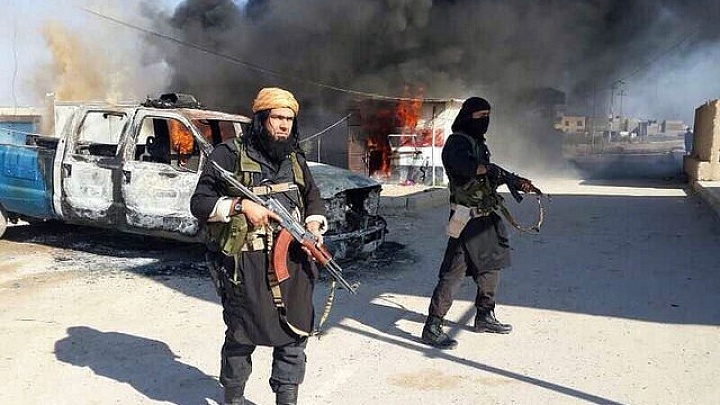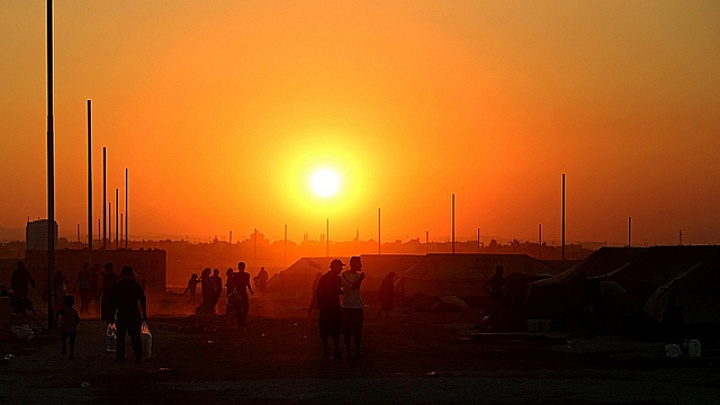
On a hot summer’s afternoon last week, I visited the 9/11 Memorial at the Pentagon. After a day of news dominated by airstrikes in Iraq, I felt this was an appropriate reminder. In silence, I walked past the 184 benches in the memorial, one for each of the men, women, and children who died in the attack on the Pentagon. They were victims of the terrorist group al-Qaeda, which had grown in power and influence during the 1990s after establishing a base in the Afghanistan mountains. Eventually, al Qaeda used the sanctuary it found there to stage an attack that reached New York and Washington D.C.
Today, the Islamic State of Iraq and Syria (ISIS) has established a base of operations, armed itself with weapons captured from the United States, and acquired at least one potential weapon of mass destruction. Our President has decided to engage ISIS while the threat it poses is still growing. This will be difficult. He will be criticized on all sides. The President faces the same difficult choices as his predecessors. At any time, there exists a myriad of threats that, if left unchecked, could grow and eventually bring terrible pain. The good news is that, given effective leadership that garners the will of the American people, the United States can deter or defeat any one of them. It cannot neutralize all of them at once, however. Determining which threats to address now is nearly impossible to do well, but every President—and the government he or she leads—is obligated to do their best.
I know of no one who relishes a return to Iraq. But if the alternative is the establishment of a well-resourced Islamic pseudo-state that enjoys sanctuary from which to export terrorism to the West, the wise choice is the hardest one.
They will be criticized, inevitably. In today’s hyper-politicized world, no leader gets credit for adversaries deterred or attacks prevented. Yet deterrence and prevention are infinitely better than the alternatives. On 9/11, we experienced one of those alternatives. While al-Qaeda grew during the 1990s and learned how to export terrorism around the world, there was a window when the group was vulnerable to attack. At the time, there was no way that the President could have known exactly how that threat would eventually project its will on our people. There were warning signs, but no smoking guns.
I am an Air Force pilot, and on 9/11, I was ordered to land early while flying a training mission. I still remember the profound sense of failure that I felt after climbing out of my fighter cockpit and watching the attacks unfold. In the shock of that day, it was evident that al-Qaeda had found a way to bring hate to our shores, and we had failed to prevent it. ISIS is not al-Qaeda, and we cannot know for certain if ISIS will export terror to the United States. In many ways, however, the ISIS of today is even more concerning than al-Qaeda in the 1990s. Unlike al-Qaeda, ISIS has established a true sanctuary in the heart of the Arab world, and it seems fully capable of defending this territory absent intervention from the great powers. It has captured a significant amount of weapons and supplies from the Iraqi Army (originally supplied by the United States), and these have tipped the balance of power in Northern Iraq against the Kurds, our truest allies in the region.
ISIS has also seized control of the Mosul Dam, which holds back a reservoir of water so large that it is easily seen from space. Were it to release the water suddenly, it could flood the Tigris River valley, unleashing a terrible wave of destruction. There is a scary precedent for this, as ISIS released water from the much smaller Fallujah Dam in April, flooding a widespread area extending to the outskirts of Baghdad. Like al-Qaeda, ISIS is grounded in the teachings of Sayyid Qutb, the Egyptian interpreter of the Koran. In his voluminous essays, Qutb calls for the establishment of the caliphate, a vast, uncompromising theocracy based on strict sharia law. For Qutb’s followers, there can be no separation of the secular and sacred. Any attempt to maintain such separation is not just misguided…it is evil and must be eradicated, even if it means the death of the faithful. While the United States is not the only country that establishes a secular government with a responsibility to protect religious choice, it is the most powerful and the most visible. Not surprisingly, ISIS leaders talk openly about attacking the United States. Given Qutb’s teachings, it seems likely that this is more than bluster.
I know of no one who relishes a return to Iraq. We have spent too much time away from loved ones, lost too much of our treasure, and seen too much blood spilled in that country already. But if the alternative is the establishment of a well-resourced Islamic pseudo-state that enjoys sanctuary from which to export terrorism to the West, the wise choice is the hardest one: To take on the group now, before they grow more powerful and capable.
Doing so will invite criticism and unfavorable comparison to previous invasions of Iraq. It will mean trying to garner support from an American people whose war-weariness is palpable. It will be tough for all involved, especially for those who must leave their loved ones, once again, and return to the heat of Iraq.
[Photo source: Scroll Editorial via Flickr Commons]
Colonel Clint Hinote, USAF, is a 2014-2015 Military Fellow at the Council on Foreign Relations. He recently commanded the 8th Fighter Wing at Kunsan Air Base, Republic of Korea and served as the U.S. Forces Korea Area VI commander for more than 7,000 Air Force and Army combat ready and forward deployed personnel.The conclusions and opinions expressed are this own and do not reflect the official position of the U.S. government.


Colonel Hinote,
I think you crystallized the rationale with excellence. May those who should be listening. Purposeful intervention now would hopefully be a far less of a price to pay than merely waiting in hope. ISIS has openly declared and acted upon its ideology…it isn’t going to improve, in terms of how it treats others.
I’m trying to reach RG Smith, an LSMA grad.
Have I found the right Bob Smith?
Unfortunately and regrettably, the Colonel speaks the truth.
Hopefully, we will not kick the can down the road again and wait for an attack on hour homeland.
In what sense has our President chosen to “…engage ISIS while the threat it poses is still growing.”?
Sir,
Excellent article, as always! Your insight into this situation is grounded by real-world experience and insight into the complexities of the region. You’re absolutely correct that this transcends political affiliation/blame and we must focus on the way ahead.
Well said, Colonel Hinote. It is easier to extinguish a small bush fire before it rapidly grows to engulf an entire forest.
The failure in this line of thought is that it does not embrace the only proven method of handling an adversary that is motivated by blind faith. My grandparents and their brothers in arms faced similar blind devotion to brutal violence. It took the manhattan project to counter that brutal and vicious warrior cast. A cast that believed in suicide attacks, mass casualty attacks and xenophobic ambition to justify mass slaughter.
While I agree with the premise that finishing the fight early it the best way to win, we crossed that precipice almost a decade ago. I was young when I volunteered, then volunteered again, then volunteered again, and then volunteered again. Four times I stood in someone else’s stead. I watched my little brother volunteer, then volunteer again, then volunteer again. I watch my brother charge into the breach live in the T.O.C.
My son who was born at the dawn of this war will likely have the opportunity to have his life snuffed out as another volunteer. Any action short of total war is a slow surrender and ultimately death for our children. If we charge into the breach again, it should be with the sober and somber resolve to end it as Clausewitz would have… loose all of the arrows in out quiver and slaughter those that will not surrender, for that is what we face.
-Will
35M30/Arabic Linguist
I ask you permission to give my opinion, as watching from outside all the toubles left behind after so many inevitable interventions your Country led to.
Fighting terrorists, having to pulling them out from the shadows, needs a Strategie.
Different again now considering ISIS.
The reallity is that the evil will ever and ever rise again. We never know where or when. And somebody always need to take action.
I think is what always has been given less importance was not the “how” to respond to the current problems, as worse as they seem, but it appears the most important questions to justifie any sacrifice were not considered ever: who is the problem? do I really know the problem? is there a solution for the problem? what really solves the problem? How far do we want to go? If going this far is not acceptable to the society, what can really be done?
There must be, first of all, established the new status quo necessary to be achieved after the war. All the consequences must be precisely envisioned and cannot be neglected during the decision process.
In my Country, the authoirithies, again and again climb the favelas to fight the organized crime, but merely to satisfy the society politically and never have the gut to really start to think at what really needs to be done to solve the problem.
Sorry for my language errors. English is not my first language.
Honors to all american that gave their lives to fight terror, and may God support their families.
Thank you.
One more reason to consider the lethality of this group is the ability to fund itself. Stealing and selling oil to the tune of 100+ million dollars makes this group able to purchase some of the best arms on the planet. They are aware of U.S. methods and tactics. They are paying attention and we need to change up our methods and tactics.